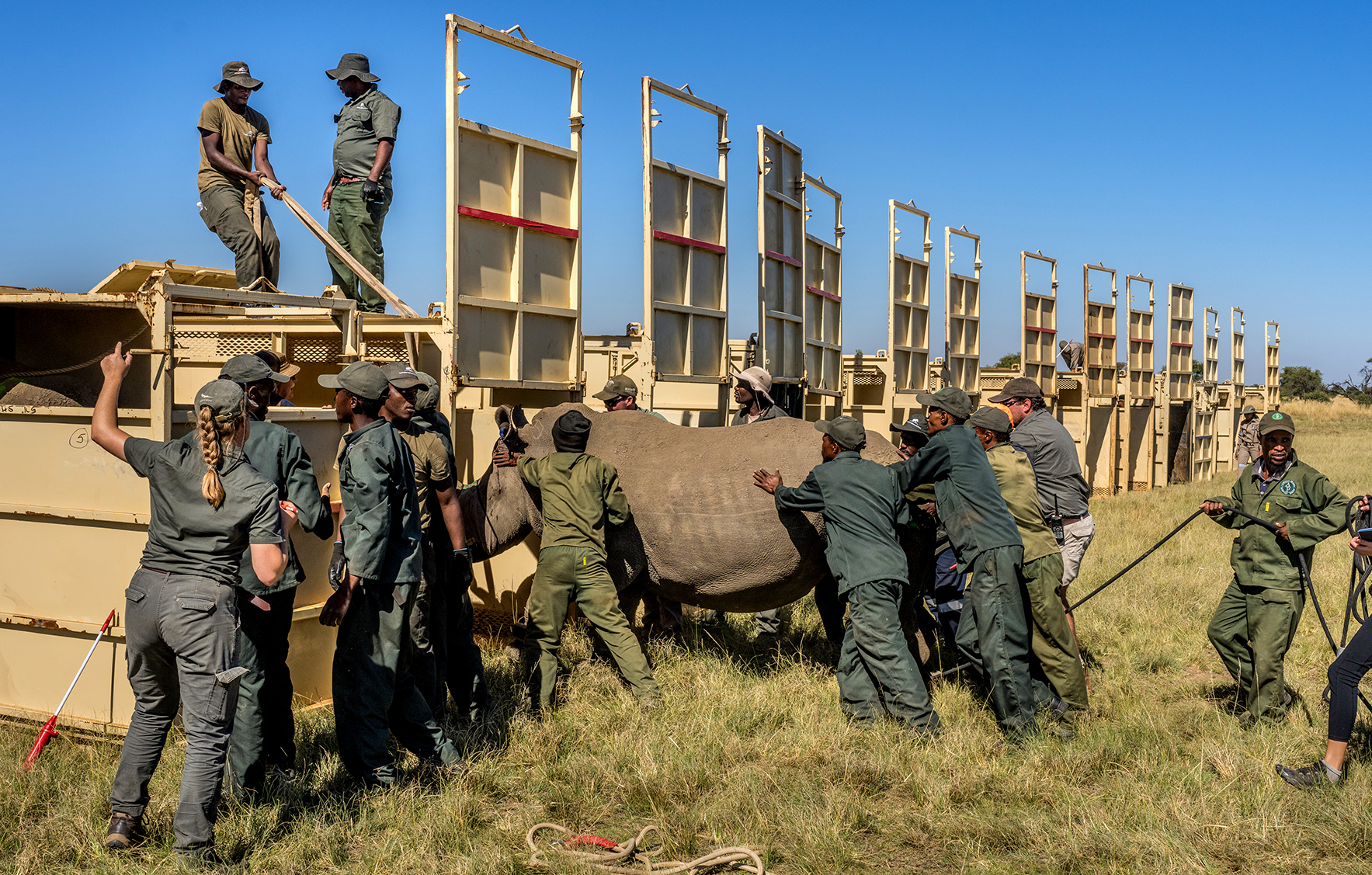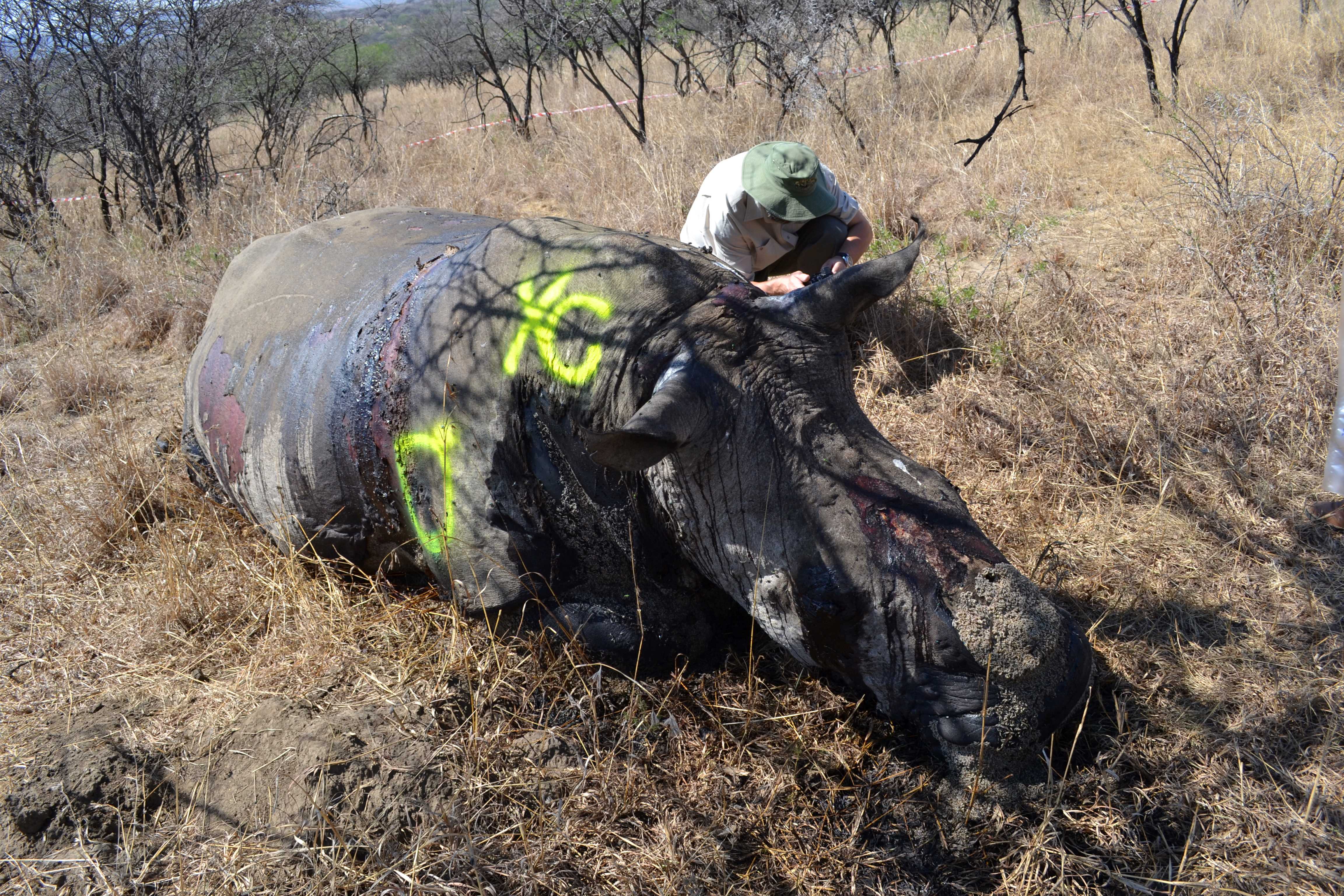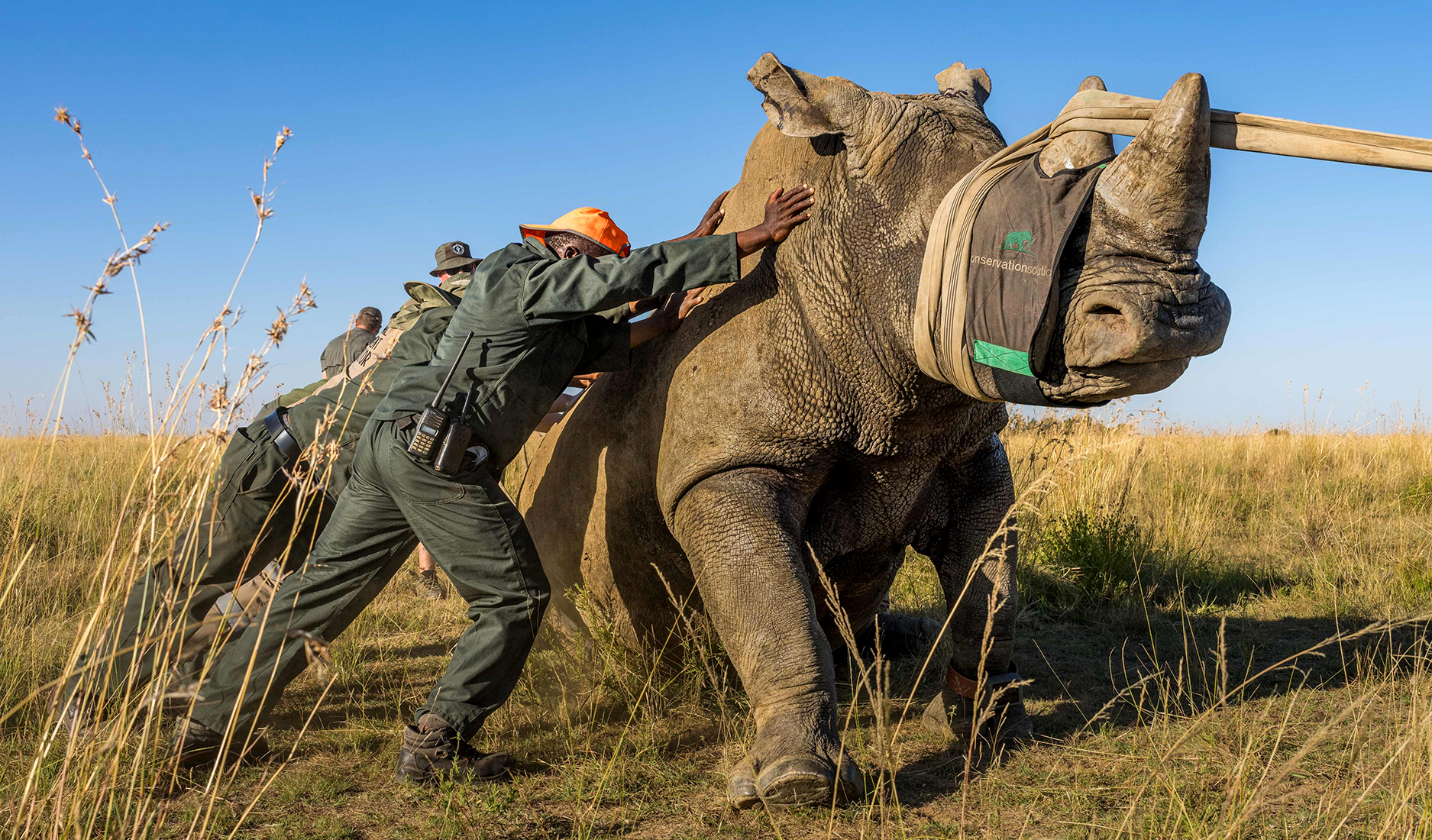Forty rhinos, formerly part of the world’s largest privately owned rhino population, are among nearly 2,000 southern white rhinos bought last year by the African Parks group as part of an ambitious plan to rescue and then “rewild” the animals in game reserves across the continent.
The new home for this first batch of animals to be translocated is the 30,000-hectare Munywana Conservancy in northern KwaZulu-Natal, a Big Five reserve owned collectively by local communities and private landowners that includes the Makhasa Community Trust, the Mnqobokazi Community Trust, &Beyond Phinda and Zuka private game reserves
The rhinos were part of a massive private herd that multiplied over decades at a game ranch in North West owned by the entrepreneur John Hume, who planned to harvest and sell their horns legally to buyers in the Far East.
However, with no indication that the 1974 international ban on the trade in rhino horns would be lifted any time soon, Hume announced last year that he had run out of funds to keep his project going and put them all up for sale.
 Game capture staff use ropes and muscle power to coax a rhino to its transport crate. (Photo:© Wiki West from WeWild)
Game capture staff use ropes and muscle power to coax a rhino to its transport crate. (Photo:© Wiki West from WeWild)
 Some of the first 40 rhinos are loaded into crates for translocation to Munywana Conservancy. (Photo: Marcus Westberg)
Some of the first 40 rhinos are loaded into crates for translocation to Munywana Conservancy. (Photo: Marcus Westberg)
 A convoy of game capture trucks loaded with 40 rhinos arrive at the Munywana Conservancy. (Photo: Marcus Westberg)
A convoy of game capture trucks loaded with 40 rhinos arrive at the Munywana Conservancy. (Photo: Marcus Westberg)
After the auction flopped, they were later purchased for an undisclosed sum by African Parks. The Johannesburg-based non-profit conservation organisation has long-term agreements to manage and rehabilitate 22 protected areas in 12 African countries.
Significantly, the rescued rhinos are descended from parent animals purchased at auctions over several decades in KwaZulu-Natal from the provincial nature conservation agency, Ezemvelo KZN Wildlife.
Before the massive surge in rhino poaching in South Africa that began in around 2008, Ezemvelo considered that it had too many rhinos in some of its reserves and put up scores of surplus animals for sale every year.
Relentless poaching
That’s all changed, however. Ezemvelo’s flagship, Hluhluwe-iMfolozi Game Reserve, is now under relentless attack by gangs of armed poachers. Last year, poaching of KZN’s rhino population reached its worst levels yet, with the province accounting for 65% of all rhinos killed nationwide in 2023.
In desperation, Ezemvelo began a major operation last month to reduce poaching by immobilising and dehorning rhinos in Hluhluwe-iMfolozi and other Zululand reserves to.
![]() A rhino, with a tracking device fitted to its foot, begins to explore its new home. (Photo Marcus Westberg)
A rhino, with a tracking device fitted to its foot, begins to explore its new home. (Photo Marcus Westberg)
Though Munywana is barely 40km from the killing fields of Hluhluwe-iMfolozi, African Parks is confident that the first new home for Hume’s rhinos is a more secure refuge.
“The crux of the solution, and the ultimate success for rewilding these 2,000 rhinos, lies in the existence of safe, well-protected and effectively managed areas across Africa, of which the Munywana Conservancy is an excellent example,” said Peter Fearnhead, the CEO of African Parks.
The Munywana Conservancy dates back to 2007 and includes 9,085 hectares of land returned to its ancestral owners, the Makhasa and Mnqobokazi communities, as part of the national land restitution process.
Both communities have kept much of this land under conservation and dropped fences with neighbouring properties to establish the 29,866-hectare Munywana reserve.
Thokozani Mlambo, the chairperson of the Makhasa Trust — one of the four primary shareholders of the Munywana Conservancy — was among a group of local leaders who gathered at the reserve on 9 May to witness the arrival of the first rhino convoy.
“We are extremely pleased to receive these rhinos from African Parks to supplement the current population of white rhinos at our community conservancy,” he said.
“We see this as recognition of the important role that community-owned land plays in conservation, and we are proud to be collaborating in such a significant partnership to rewild rhinos across our continent.”
Barbara Creecy, the minister of forestry, fisheries and the environment, welcomed the rewilding drive’s first part.
Read more in Daily Maverick: Two out of three SA white rhinos now in private hands while poachers decimate KZN herds
“I am especially pleased to see that the very first translocation of some of the 2,000 white rhinos is going to this important landscape within South Africa, which is a flagship partnership in which communities are making a significant contribution to the conservation of our natural heritage,” she said.
“On behalf of the government of South Africa, we were very supportive of African Parks’ plan to purchase and rewild these rhinos and remain a key partner in providing technical and scientific advice and the support needed to carry out this conservation solution in South Africa and on the African continent.”
 Thokozani Mlambo, chairperson of the Makhasa Trust, watches the unloading of the 40 new arrivals. (Photo: Marcus Westberg)
Thokozani Mlambo, chairperson of the Makhasa Trust, watches the unloading of the 40 new arrivals. (Photo: Marcus Westberg)
The new arrivals will be closely monitored as they adjust to their new environment. Previously, the Hume herds were kept in large “camps” in a relatively dry and desolate landscape in North West, where they were fed with supplemental feed during winter.
The Munywana Conservancy said it would implement “intensive security measures” to ensure the safety of the 40 rhinos, which will all be dehorned regularly to discourage poaching.
The translocation was carried out by African Parks, &Beyond Phinda, Conservation Solutions and WeWild Africa with the financial support for the move provided by the Aspinall Foundation and the Wildlife Emergency Fund.
Read more in Daily Maverick: Rewilding Africa the tough way — lessons from Majete in Malawi
“We recognise the magnitude and logistical feat of moving 2,000 rhinos. This is just the beginning of a long-term partnership with African Parks where we can play our part in making a tangible contribution to the future of the southern white rhino in Africa,” said Damian Aspinall, the chairperson of WeWild Africa.
 A wildlife manager collects evidence from the carcass of a dehorned rhino in Ezemvelo’s Weenen Nature Reserve. (Photo: Ezemvelo KZN Wildlife)
A wildlife manager collects evidence from the carcass of a dehorned rhino in Ezemvelo’s Weenen Nature Reserve. (Photo: Ezemvelo KZN Wildlife)
Fearnhead said the “Rhino Rewild” operation was “one of our most ambitious undertakings to date, where together with a multitude of governmental, conservation and community organisations, and key funders, we have the rare opportunity to help derisk a species, and in the process to help secure some of the most critical conservation areas not just in Africa, but in the world.”
The initial funders of Rhino Rewild include the Rob Walton Foundation, the Pershing Square Foundation, WeWild Africa, the Aspinall Foundation and the Wildlife Emergency Fund. DM
https://www.youtube.com/watch?v=REeWvTRUpMk




 A wildlife manager collects evidence from the carcass of a dehorned rhino in Ezemvelo’s Weenen Nature Reserve. (Photo: Ezemvelo KZN Wildlife)
A wildlife manager collects evidence from the carcass of a dehorned rhino in Ezemvelo’s Weenen Nature Reserve. (Photo: Ezemvelo KZN Wildlife)